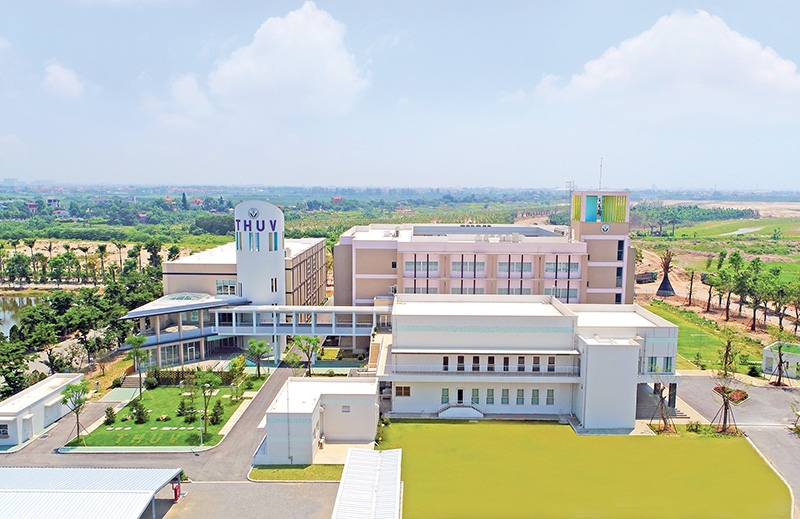Japan holding interest in real estate
 |
| Many Japanese developers have been showing long-term interest in property development |
Financiers from the East Asian island nation have diversified their portfolios from residential and hospitality to other segments of offices, complexes, and industrial real estate in Vietnam.
Among the dozen real estate licences handed out for foreign direct investment ventures in the first four months of this year, Panasonic emerged with a workshop project valued at more than $25.5 million located in Thang Long Industrial Park II in the northern province of Hung Yen.
Nearly 22,000 square metres of workshop space will be constructed between 2023 and early 2024, with the project set to come into operation around April of that year.
In March this year, Toshin Development under Takashimaya Group cooperated with domestic Trung Thuy Group to invest in a complex of apartments, offices, and commercial space in Hanoi.
According to Toahiteru Sato, chief of the representative office of Toshin Development in Ho Chi Minh City, the company believes that pandemic control, the attraction of the recently-signed EU-Vietnam Free Trade Agreement, and the general goal of becoming a key bases in new global supply chains means Vietnam is expected to welcome a new wave of investment, as well as a higher demand for offices for lease.
Meanwhile, Yoshio Mutara, president at Takashimaya, said that there is much room for the company to expand its portfolio in different segments in Vietnam.
After investing in Vietnam with its first retail centre in Ho Chi Minh City in 2016 at $25 million, Takashimaya last December announced a $12 million high-quality school system in the Starlake urban development project, one of the biggest foreign-invested urban schemes in the Vietnamese capital. Also in this project, Takashimaya expects to build a multi-use project comprised of retail facilities which will be developed between 2022 and 2025.
Shingu Akihiro, general director of Anabuki Housing Group, said that Japanese investors are impressed with the Vietnam’s development momentum, especially the relatively high population growth and GDP growth and urbanisation.
According to the World Bank, the urbanisation rate in Vietnam in the 2015-2020 period was 2.6 per cent, equal to Thailand and higher than Indonesia, Singapore, and the Philippines, while during 2010-2015 it reached 3 per cent.
Toru Tomita, general director of the O.M.NET Cooperative Business Association – a trade union based in Osaka – said that Vietnam is a young country with abundant and very attractive labour resources. “Currently, Vietnam has a lot of real estate companies with a huge amount of products. However, the potential in this area is still huge and Japanese investors have been aware of this and are jumping into the market,” Tomita said.
Japanese investors have been familiar with the traditional real estate segment of Vietnam of retail, residential, and hospitality development.
In retail, AEON Group expects to expand its current network of six supermarkets to 20 in the country by 2025, with the total funding of up to $2 billion.
In hospitality, Kajima is joining Indochina Capital to develop a network of 20 hotels and tourism complexes with more than $1 billion mobilised over the next decade. The first hotel of the chain, Wink Saigon Centre Hotel, officially opened in March.
Nomura Real Estate Development at the end of 2020 cooperated with domestic group Ecopark Corporation JSC to develop a residential building in the northern province Hung Yen’s Ecopark, the largest township development in Vietnam. Nomura’s project name of Swan Park Onsen will provide 3,000 apartments and expects to hand them over to buyers during 2024-2025.
In Vietnam, Nomura joined the Phu My Hung Development Corporation project in 2015 and has since been engaging in condominium housing and office building projects in Ho Chi Minh City. Before Nomura, other Japanese partners had also joined with Ecopark to develop Waseda Academy of Medicine Japan and Tokyo Human Health Science University Vietnam.
Samty Corporation is another Japanese company working with Vingroup to develop The Sakura residential venture, located in Vinhomes Smart City in Hanoi.
Mitsubishi and Nomura have joined with Vingroup to develop the second phase of the Vinhomes Grand Park in Ho Chi Minh City, with an investment of over $900 million to develop 21 residential buildings with a total of 10,000 units.
What the stars mean:
★ Poor ★ ★ Promising ★★★ Good ★★★★ Very good ★★★★★ Exceptional
 Tag:
Tag:
Related Contents
Latest News
More News
- Construction firms poised for growth on public investment and capital market support (February 11, 2026 | 11:38)
- Mitsubishi acquires Thuan An 1 residential development from PDR (February 09, 2026 | 08:00)
- Frasers Property and GELEX Infrastructure propose new joint venture (February 07, 2026 | 15:00)
- Sun Group led consortium selected as investor for new urban area (February 06, 2026 | 15:20)
- Vietnam breaks into Top 10 countries and regions for LEED outside the US (February 05, 2026 | 17:56)
- Fairmont opens first Vietnam property in Hanoi (February 04, 2026 | 16:09)
- Real estate investment trusts pivotal for long-term success (February 02, 2026 | 11:09)
- Dong Nai experiences shifting expectations and new industrial cycle (January 28, 2026 | 09:00)
- An Phat 5 Industrial Park targets ESG-driven investors in Hai Phong (January 26, 2026 | 08:30)
- Decree opens incentives for green urban development (January 24, 2026 | 11:18)























 Mobile Version
Mobile Version